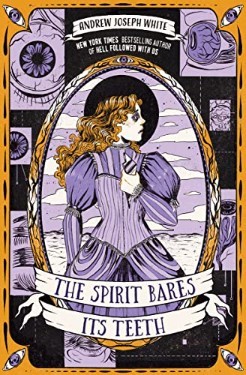The last time I spoke to my brother was six months ago. I remember the date exactly: the twenty-second of April, 1883. How could I not? It's burned into me like a cauterized wound, an artery seared shut to keep from bleeding out.
It was his wedding, and I was on the edge of hysterics.
I wasn't being difficult on purpose. I wasn't, I swear. I never mean to be, no mat- ter what Mother and Father say. I'd even promised it would be a good day. I wouldn't let the too-tight corset send me into a fit, I wouldn't tap, I wouldn't fidget, and I certainly wouldn't wince at the church organ's high notes. I would be so per- fect that my parents wouldn't have a reason to so much as look at me.
And why shouldn't it have been a good day? It was my brother's wedding. He'd just returned to London after a few months teaching surgery in Bristol, and all I wanted was to hang off his arm and chatter about articles in the latest Edinburgh Medical Journal. He would tell me about his new research and the grossest thing he'd seen after cutting someone open. He'd quiz me as he fixed his hair before the ceremony. "Name all the bones of the hand," he'd say. "You have been studying your anatomy, haven't you?"
It would be a good day. I'd promised.
But that was easy to promise in the safety of my room when the day had not yet started. It was another to walk into St. John's after Mother and Father had spent the carriage ride informing me I'd be married by the new year.
"It's time," Mother said, taking my hand and squeezing-putting too much pres- sure on the metacarpals, the proximal phalanges. "Sixteen is the perfect age for a girl as pretty as you."
What she meant was, "For a girl with eyes like yours." Also, it wasn't. The legal marriageable age was, and still is, twenty-one, but the laws of England and the Church have never stopped the Speakers from taking what they want. And it was clear what they wanted was me.
It was like the ceremony became a fatal allergen. While Father talked with a col- league between the pews and Mother cooed over her friends' dresses, I dug my fin- gers into my neck to ensure my trachea hadn't swollen. The organist hunched over the keys and played a single note that hit my eardrums like a needle. Too many peo- ple talked at once. Too loud, too crowded, too warm. The heel of my shoe clicked against the floor in a nervous skitter. Tap tap tap tap.
Father grabbed my arm, lowered his voice. "Stop that. The thing you're doing with your foot, stop it."
I stopped. "Sorry."
On a good day, I could stomach big events like this. Parties, festivals, fancy dinners. Sometimes I even convinced myself I liked them, when George was there to protect me. But that's only because a legion of expensive tutors had trained me to. They'd molded me from a strange, feral child into an obedient daughter who sat with her feet tucked daintily and never spoke out of turn. So, yes. Maybe, if it had been a good day, I could have done it. But good days had suddenly become impossible.
